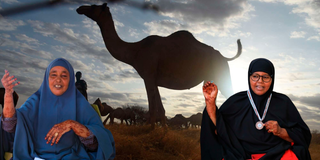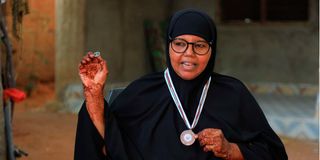Inside the revolutionary female council challenging 500 years of male-only leadership

The women who dared to become what was forbidden - Habiba Mohammed (left) and Safi Abdillahi, both members of the Women Council of Elders.
What you need to know:
- Wajir's female elders rewrite destiny , a retired teacher, founded the groundbreaking Wajir Women Council of Elders in 2019 to challenge decades of female exclusion from leadership in this traditionally patriarchal community.
- Their persistent advocacy led to unprecedented success in the 2022 elections when two women became the first-ever female MCAs in Wajir.
- The council's work continues to transform attitudes through community dialogues and capacity building.
"Welcome home," says Habiba Mohammed, gesturing toward plastic seats arranged beneath the shade of a tree that stands in the middle of her compound. The afternoon sun beats down mercilessly on the outskirts of Wajir town, making this natural canopy a precious refuge.
Her smart stone house stands out prominently among neighbouring dwellings, but it's not the architecture that makes this place remarkable. It's what Habiba initiated in 2019 that truly distinguishes her in this traditionally patriarchal community.
That year, the retired teacher did what many considered unthinkable: she founded the Wajir Women Council of Elders. The lobby group emerged as a direct challenge to decades of female exclusion from leadership positions in a region where men have maintained exclusive control over political decisions.
"Women in our community have been side-lined in leadership and governance for decades," Habiba explains, her voice carrying the authority of someone who has dedicated her life to education and human rights activism. The council she helped create isn't just another women's group—it's a strategic coalition of professionals, including teachers, lawyers, doctors, gender champions, and businesswomen, all united by a single purpose.
"Our primary objective is to increase the number of women leaders in the community," she states firmly.
Strategic interventions
Locally, the Women Council of Elders has devised a multi-pronged approach. They organise awareness campaigns and community dialogues targeting the very gatekeepers of power – men, elders, and religious leaders who have traditionally opposed women's leadership. These conversations challenge deeply entrenched patriarchal attitudes that have kept women from decision-making tables.
"We have made remarkable progress as the community is slowly starting to embrace women leadership," Habiba tells Nation.Africa.
"In the 2022 General Election, for example, we had 15 women from 15 clans who were given the green light by the elders to run for the MCA seat."

Habiba Mohammed, a retired teacher and human rights activist speaks in this photo taken on February 25, 2025 at her home in the outskirts of Wajir town. She is the founder of Wajir Women Council of Elders.
This permission marked a significant shift in a community where women have historically been excluded from such opportunities. Even more encouraging were the results: "Out of the 15 women who were allowed to run, two of them won and became the first women elected MCAs. Our campaign played a critical role in realising these remarkable results," says Habiba.
Similar initiatives are unfolding across Kenya, supported by a larger project called "Expanding Spaces for Women Political Participation in Kenya." Spearheaded by Uraia Trust with support from UN Women and funding from Global Affairs Canada (GAC), this project has identified Wajir among seven counties where women face significant barriers to political participation.
Persistent challenges
The path to leadership remains strewn with obstacles for women in Wajir. As Habiba candidly acknowledges, "Women who offer themselves for leadership positions normally get it rough on the ground. They have no money to campaign and are bullied by their opponents. Sexual harassment is also rife for women while on the campaign trail."
Despite these barriers, the impact of having women in decision-making positions cannot be overstated.
"Women leaders are good and better – they are not corrupt and are merciful and have empathy. If given the opportunity to lead, they definitely initiate some programs to improve the lives of women," Habiba notes.
The systemic exclusion of women is deeply embedded in local governance structures. In Wajir, the traditional council of elders—locally known as the Sultanate at the clan level and Ugasin at the sub-clan level—does not include women. Yet these all-male committees wield enormous power, as they recruit individuals from their respective clans and sub-clans to fill available leadership positions.
Voices of change
Safi Abdillahi, a member of the Women Council of Elders and a recognised human rights defender, identifies "negotiated democracy" as the biggest threat to women's leadership in Wajir. This system, prevalent across North-Eastern Kenya, has systematically excluded women from governance roles both in local communities and national politics.
"When women take their applications to the vetting committee, they are normally kept aside. When selecting candidates, women are never selected despite meeting the necessary qualifications," Safi tells Nation.Africa.
Last year, her dedication to human rights advocacy earned her the Shujaa Award from the National Heroes Council. Yet personal accolades aren't her ultimate goal—she dreams of witnessing gender equality benefit women across Kenya and seeing women occupying the highest offices in Wajir County.
"It is us, women, who will break this oppressive system," she declares. "Lack of financial muscle is the biggest challenge that women face in their quest for leadership in our community today. I, for example, had the intention to vie in the last election but had no money."

Safi Abdullahi, a human rights activist speaking in this photo taken on February 25, 2025 in Wajir town. She is a member of the Wajir Women Council of Elders.
Her campaigns have revealed another troubling dynamic: men often incite women against supporting female candidates, effectively using division as a tool to maintain the status quo. Despite these tactics, Safi remains undeterred, calling on women to "turn out in large numbers and vie for different positions come the 2027 election. They have what it takes to lead."
International support meets local action
The UN Women Country Representative, Antonia N'Gabala-Sodonon, emphasises that "women's leadership is crucial to inclusive governance and sustainable development." Through the support of Global Affairs Canada, UN Women has been strengthening women's political engagement in Wajir and six other counties by addressing the barriers they face and enhancing their capacity to influence decision-making.
"Advancing women's political participation requires a multifaceted approach," N'Gabala-Sodonon explains. This includes "addressing legal and structural barriers, capacity building, amplifying the visibility of women leaders, gender-sensitive media coverage, and engagement of male allies to drive a positive shift in societal norms."
The impact of these combined efforts—grassroots activism by groups like the Wajir Women Council of Elders and institutional support from international organisations—is beginning to show. Janine Cocker, Head of Development Cooperation at the Canadian High Commission in Nairobi, notes with satisfaction that the 2022 elections saw more women leaders elected compared to 2017.
"There has been an increase of women leadership both at the national and county levels which is commendable. A robust team work helped yield these wonderful results. Women need to be at the decision making table," Cocker says.
The establishment responds
Bishal Ahmed, an elder and member of the Sultanate, offers insight into the traditional power structures being challenged. He emphasises the committee's role in selecting "the best leaders" for the community, and when confronted about discrimination against women, his response reveals the depth of cultural entrenchment.
"This is our culture and religion. The way we live is as a result of our culture and religion. Women always take instruction from the elders," Ahmed states.
He insists that elders have no vested interests when selecting candidates and are guided solely by community welfare.
"The people we pick for the various positions must meet certain qualifications. They must be honest, religious, development conscious and not corrupt," he explains.
Ahmed pushes back against criticisms that elders oppose women's leadership, pointing to the two women MCAs who were elected after receiving elder support. However, his justification highlights how exceptional these cases are rather than representing systemic change.
Capacity building for lasting impact
Beyond challenging the elders' committees, the Wajir Women Council of Elders conducts capacity building sessions and civic education for women. These initiatives enlighten women about their rights to seek both elective and appointive positions while also educating them about their power as voters.
This local effort aligns perfectly with the broader objectives of the "Expanding Spaces for Women Political Participation in Kenya" project, which operates across seven counties: Samburu, Kisii, Homa Bay, Embu, Kericho, Wajir, and Kajiado. The initiative focuses not only on empowering women but also on engaging men through capacity-building programs designed to change mind-sets about women's leadership in traditionally patriarchal communities.
Back in Habiba's compound, where our conversation began, the struggle for equality continues. The tree that provides shade from the scorching sun seems an apt metaphor for the protection and strength that the Women Council of Elders offers to aspiring female leaders. In this harsh political landscape, they have created a space where women's ambitions can be nurtured and where, branch by branch, the old structures of power are being reshaped.
"We have made remarkable progress," Habiba reiterates, "but there is still much work to be done."
dmaichuhie@ke.nationmedia.com


